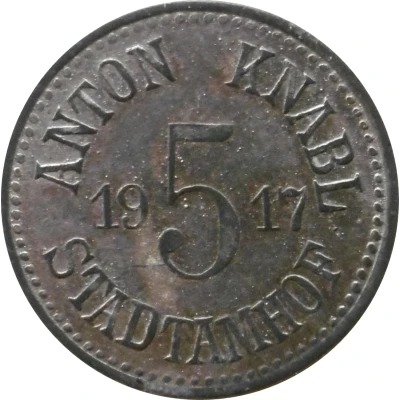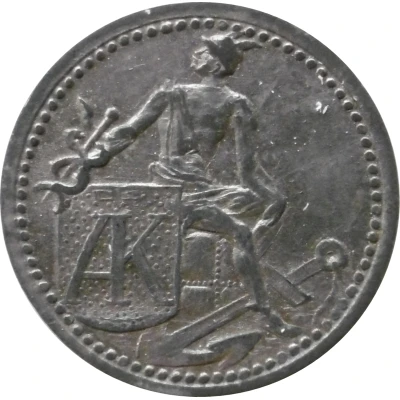


© Willem63 (CC BY-NC-SA)
5 Pfennigs - Stadtamhof Anton Knabl
1917 year| Zinc | 1.6 g | 18 mm |
| Issuer | City of Stadtamhof (Federal state of Bavaria) |
|---|---|
| Emperor | William II (Wilhelm II) (1888-1918) |
| Type | Standard circulation coin |
| Year | 1917 |
| Value | 5 Pfennigs (5 Pfennige) (0.05) |
| Currency | Mark (1914-1924) |
| Composition | Zinc |
| Weight | 1.6 g |
| Diameter | 18 mm |
| Thickness | 1.0 mm |
| Shape | Round |
| Technique | Milled |
| Orientation | Medal alignment ↑↑ |
| Demonetized | Yes |
| Updated | 2024-10-04 |
| Numista | N#41547 |
|---|---|
| Rarity index | 86% |
Reverse
Pearl rim, male figure sitting, Caduceus in hand, ships anchor at foot and monogramed shield
Script: Latin
Edge
Plain
Comment
Issuing authority: [Privat, Bayern]Menzel: BBB
Fa: Gemischtwarenhandlung
Interesting fact
One interesting fact about the 5 Pfennigs - Stadtamhof (Anton Knabl) 1917 coin is that it was issued during a time of economic turmoil in Germany. The country was experiencing hyperinflation, and the value of the German mark was plummeting. In response, the government introduced a new currency, the "Notgeld," which included coins like the 5 Pfennigs - Stadtamhof. These coins were made of affordable materials, like zinc, and were designed to be used for small transactions. Despite their low value, they remain a popular collector's item today, offering a glimpse into Germany's economic history.